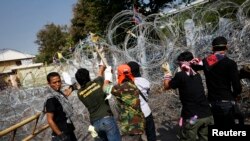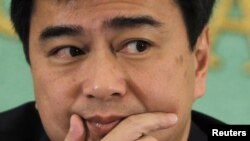BANGKOK —
The political drama in Thailand continues Thursday as protesters intent on ousting the prime minister cut off electricity to her office in the capital. Meanwhile, Yingluck Shinawatra was in Chiang Mai, a city in her party's political stronghold, where she repeated calls for dialogue to resolve the weeks-old crisis.
Thailand’s prime minister, struggling to maintain her grip on power as a caretaker until an election early next year, is calling for a national conference Sunday on political reform.
The primary opposition force, the People’s Democratic Reform Committee, however, quickly implied it would not join, saying it is holding its own meetings with key sectors prior to Sunday. It reiterated demands that Yingluck should immediately resign.
Yingluck, speaking from Chiang Mai, says the government-backed forum will be held in Bangkok.
The caretaker prime minister says the meeting is intended to listen to opinions from every sector to find the best solution for Thailand’s future.
She made the announcement just after protesters in the capital cut off electricity to the prime minister’s compound. They are demanding police, whom they consider corrupt supporters of the government, abandon the site.
In a previous encounter, police did withdraw to allow the “yellow shirt” protesters to carry out a symbolic one-day occupation of the grounds of Government House.
The yellow shirts strongly object to the continuing perceived influence of Thaksin Shinawatra, the prime minister’s brother, who was ousted in a military coup in 2006. He resides outside Thailand, unable to return home where he faces prison time for a corruption conviction.
Meanwhile Thursday, another former Thai prime minister, Abhisit Vijjajiva was granted bail after being indicted on murder charges stemming from the 2010 crackdown on pro-Thaksin “red shirt” demonstrators. About 90 people died and nearly 2,000 were injured in April of that year during the worst political violence in the country in decades.
The deputy prime minister at the time, Suthep Taugsuban, who was in charge of a special security agency to respond to the protests, did not show up for his court appearance. His lawyer requested the court give Suthep an extension, saying he is too busy leading the current protests against the government.
Suthep has requested meetings by Thursday evening with top military and police officers amid his call for a people’s revolution that would replace Thailand’s elected government with an appointed council.
Police chiefs say they would not meet with the protest leaders citing their duty to uphold the law.
A warrant has been issued for Suthep’s arrest on insurrection charges but the police have given no indication any of their officers will attempt to take him into custody.
Army Chiefs also declined the meeting request.
Suthep, however, received pledges of support Thursday from a retired general who previously headed an ultra right wing organization. A group of army cadets has also announced it is backing the anti-government movement.
The powerful military’s stance is always critical in Thailand’s frequent political crises. The generals have launched 18 coups since the end of absolute monarchy rule in 1932.
Yingluck, during an question-and-answer session with VOA News and several other organizations Wednesday, expressed confidence the military would not intervene at this juncture.
A royal decree, after the prime minister this week decided to dissolve parliament, authorized new national elections. But the opposition Democrat Party, whose members resigned en masse from parliament Sunday in a protest move, has not given a clear indication whether it will participate in the balloting set for February 2.
Thailand’s prime minister, struggling to maintain her grip on power as a caretaker until an election early next year, is calling for a national conference Sunday on political reform.
The primary opposition force, the People’s Democratic Reform Committee, however, quickly implied it would not join, saying it is holding its own meetings with key sectors prior to Sunday. It reiterated demands that Yingluck should immediately resign.
Yingluck, speaking from Chiang Mai, says the government-backed forum will be held in Bangkok.
The caretaker prime minister says the meeting is intended to listen to opinions from every sector to find the best solution for Thailand’s future.
She made the announcement just after protesters in the capital cut off electricity to the prime minister’s compound. They are demanding police, whom they consider corrupt supporters of the government, abandon the site.
In a previous encounter, police did withdraw to allow the “yellow shirt” protesters to carry out a symbolic one-day occupation of the grounds of Government House.
The yellow shirts strongly object to the continuing perceived influence of Thaksin Shinawatra, the prime minister’s brother, who was ousted in a military coup in 2006. He resides outside Thailand, unable to return home where he faces prison time for a corruption conviction.
Meanwhile Thursday, another former Thai prime minister, Abhisit Vijjajiva was granted bail after being indicted on murder charges stemming from the 2010 crackdown on pro-Thaksin “red shirt” demonstrators. About 90 people died and nearly 2,000 were injured in April of that year during the worst political violence in the country in decades.
The deputy prime minister at the time, Suthep Taugsuban, who was in charge of a special security agency to respond to the protests, did not show up for his court appearance. His lawyer requested the court give Suthep an extension, saying he is too busy leading the current protests against the government.
Suthep has requested meetings by Thursday evening with top military and police officers amid his call for a people’s revolution that would replace Thailand’s elected government with an appointed council.
Police chiefs say they would not meet with the protest leaders citing their duty to uphold the law.
A warrant has been issued for Suthep’s arrest on insurrection charges but the police have given no indication any of their officers will attempt to take him into custody.
Army Chiefs also declined the meeting request.
Suthep, however, received pledges of support Thursday from a retired general who previously headed an ultra right wing organization. A group of army cadets has also announced it is backing the anti-government movement.
The powerful military’s stance is always critical in Thailand’s frequent political crises. The generals have launched 18 coups since the end of absolute monarchy rule in 1932.
Yingluck, during an question-and-answer session with VOA News and several other organizations Wednesday, expressed confidence the military would not intervene at this juncture.
A royal decree, after the prime minister this week decided to dissolve parliament, authorized new national elections. But the opposition Democrat Party, whose members resigned en masse from parliament Sunday in a protest move, has not given a clear indication whether it will participate in the balloting set for February 2.







